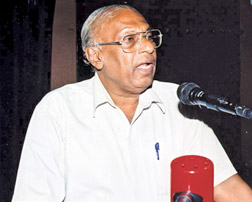|
Sri Lankan trade unionist elected to ITWF Board:
SLNSS ready to fight for workers' dues
By L.S. Ananda KANNANGARA
|

Leslie Devendra
|
The Secretary General of the Sri Lanka Nidahas Sevaka Sangamaya (SLNSS),
Leslie Devendra was elected to the Executive Board of the International
Transport Workers Federation (ITWF), which holds a membership of over
4.9 million in 149 countries. One of the most powerful trade union
federations in the world, an executive board membership is regarded as
one bringing great honour to Sri Lanka. Earlier India and Pakistan held
the position respectively.
Excerpts of an interview with Devendra.
Q: When was your trade union came into being and what is the strength
of your union?
A: In 1958 the then Prime Minister Late Mr. S.W.R.D. Bandaranaike
mooted the idea of establishing a centre for the working class which had
rallied round him. At that time trade union movement was led by
communist and Samasamaja stalwarts like Dr. N.M. Perera, Philip
Gunawardena, Dr. S. A. Wickramasinghe and Pieter Kenemun.T. B.
Illangaratne, a close associate of Prime Minister Bandaranaike organised
the SLFP trade union movement in association with Dr. W.D. Silva.
At present the SLNSS has around 100,000 members, representing all
sections of the working class including public, private and the
cooperative sectors.
Q: The working class won much of their demands during the tenure of
SLFP, UPF and UPFA governments successively led by S.W.R.D.
Bandaranaike, Sirimavo Bandaranaike and Mahinda Rajapaksa. Can you
elaborate that situation?
A: Compared with India, Bangladesh, Pakistan, Bhutan or Nepal The Sri
Lankan working class enjoys rights which their counterparts in the
region do not. Wages boards and higher salaries, provident fund,
holidays, loan schemes trade union rights, training facilities and
promotions are some of them.
Q: The UNP in 1977 turned the socialist policies pursued by the SLFP
- led successive governments. UNP's privatisation policy was one of the
radical measures taken to wreck the socialist framework. I believe your
union taught a losing battle to safeguard public enterprises. Your
comments.
A: Privatization was a sort of national crime committed by the power
hungry capitalist politicians. The National Textile Corporation, which
had factories in Thulhiriya, Veyangoda and Minneriya - where more than
5000 workers were employed is a case in point. Under the privatisation
programme all factories were shut down.
Thousands of youths lost their jobs. Hardware Corporation, Tyre
Corporation and Sugar Corporation breathed its last.President Mahinda
Rajapaksa led the anti-privatisation campaign and we backed him fully.
It was President Rajapaksa as the then Minister of labour who
presented the Workers Charter in Parliament to give a new lease of life
to the working class.
Despite Opposition by some politicians the Charter was accepted in
Principle by the then government. Seventy-five percent of the labour
charter have been implemented restoring a series of labour rights to the
working class.
The employers had to give due recognition to the trade unions and
cooperates with the trade union leaders and provide solution to labour
disputes.
Q: What kind of relationship do you maintain with the government in
the case of progovernment trade union?
A: President Mahinda Rajapaksa maintains a amicable relationship with
trade unions. He was the only Finance Minister who call for trade unions
proposals to prepare the budget. The public sector salaries were
increased five times and the private sector four times after 2005.
We are proud that our union was behind those progressive policies. We
were assured of a salary increment in the November budget.
Q: What is the present strength of the opposition trade unions,
especially JVP affliated tradeunions?
A: The JVP trade unions are on the wave. They are not in a position
to lead a strike, especially in the public sector.
Q: Are they not powerful in the government corporations such as the
Electricity Board, Petroleum Corporation or the Ports Authority?
A: No. They have a very limited membership in those places. We have
over 4000 membership in Petroleum Corporation. The SLFP trade unions
always give preference to the workers rights. As a trade union
organisation we have our own agenda independent of politics. |

